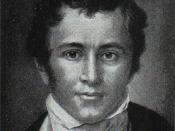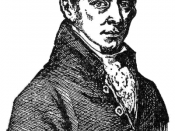Sir Humphry Davy was born on December 17, 1778 in Penzance. His father died in 1794, and Davy, in an effort to help support his family, became an apprentice to a surgeon-apothecary, which is a person who prepares and sells drugs and other medicines. Davy's most important investigations were devoted to electrochemistry, which is the science of the interaction or interconversion of electric and chemical phenomena.
In the 1800s, Davy began to test the chemical effects of electricity. He discovered that when he had passed electrical current through some substances, these substances decomposed this process was eventually called electrolysis. In 1813, Sir Humphrey Davy concocted a giant battery in the basement of Britain's Royal Society. It was made of 2,000 pairs of plates and took up 889 square feet. The voltage generated within the battery was directly related to the reactivity of the metal he used. His work led him to propose that the elements of a chemical compound are held together by electrical forces.
He then tried passing current through molten compounds, and his persistence was rewarded when he was able to separate globules of pure metal by this means. His first successes came in 1807 with the separation of potassium, his brother had said that when thrown into water, "skimmed about excitedly with a hissing sound, and soon burned with lovely lavender light." These results were presented in the Bakerian lecture, which is a prize lecture of the Royal Society on November 1807. Through electrolysis, Davy eventually discovered magnesium, calcium, strontium, and barium in 1808. However, for all of these discoveries much ground work was done by many other scientist. In 1815, he received a letter from some Newcastle miners, who told of the dangers they faced from methane gas. The gas often filled the mines, and could...


